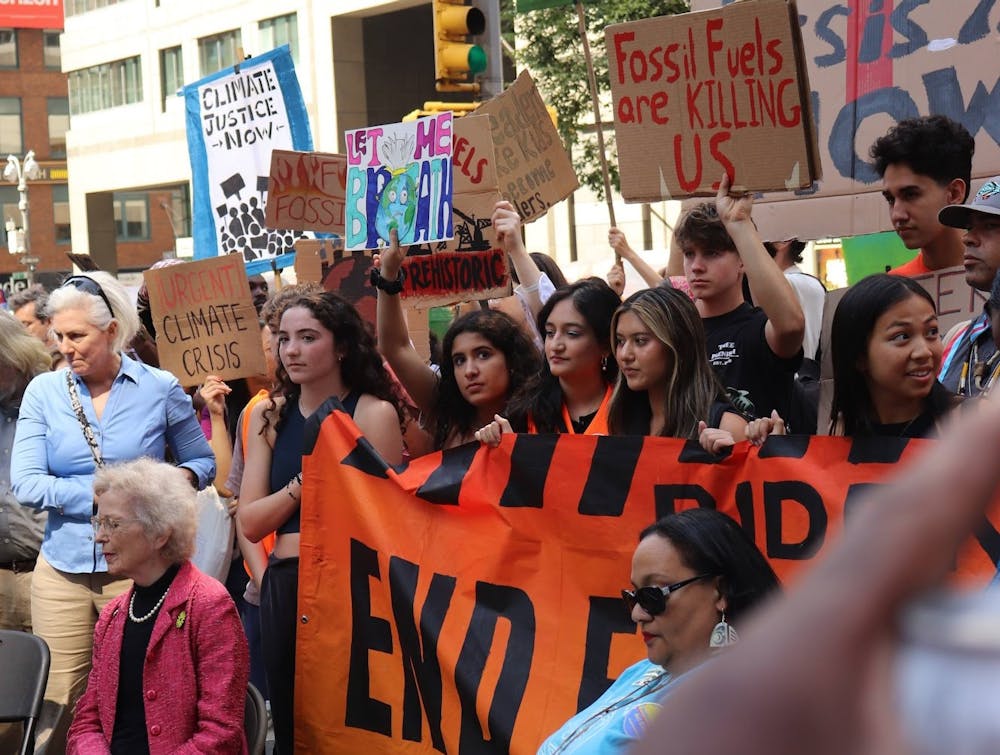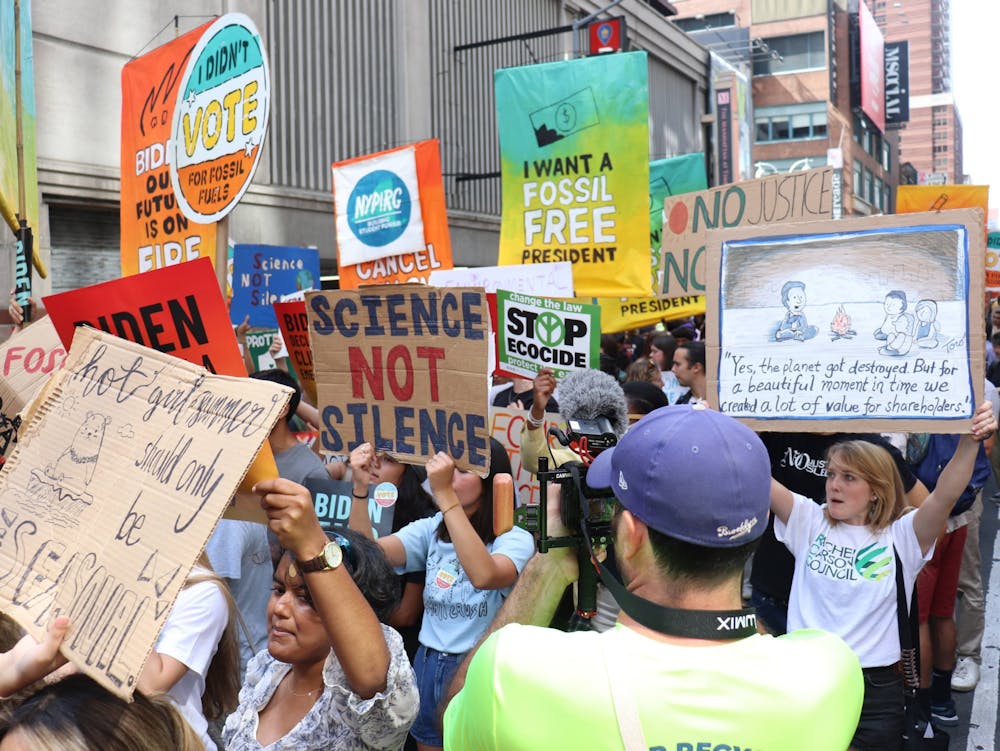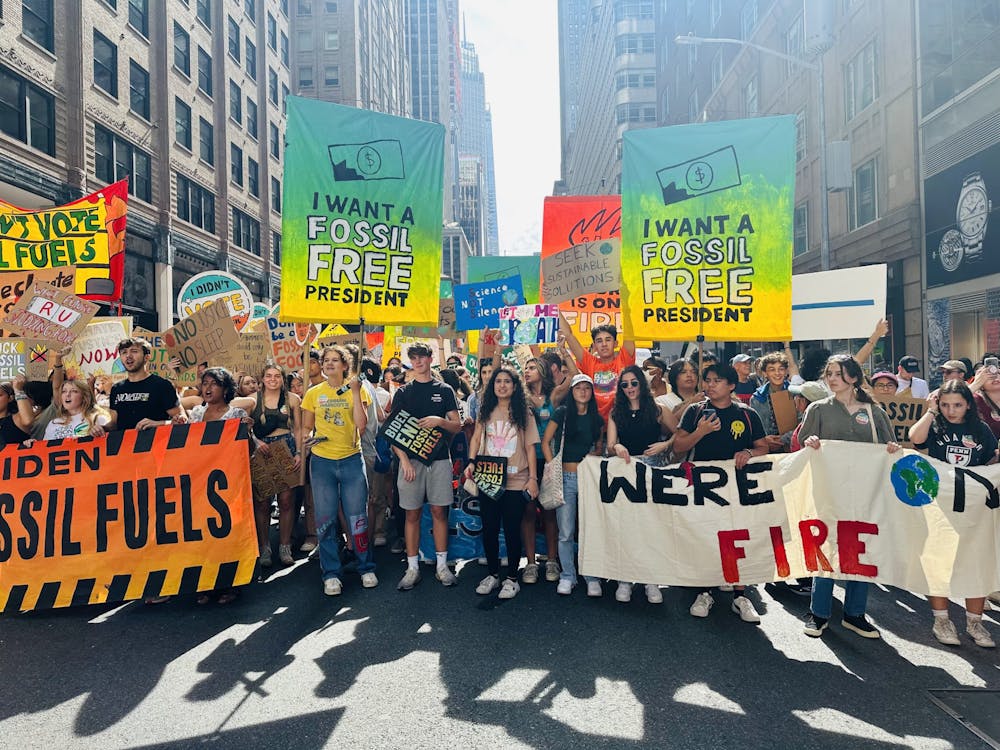Over 60 Duke students joined tens of thousands of climate protesters in New York City, calling on President Joseph Biden and other world leaders to end their support of fossil fuels and declare a climate emergency.
Biden, who was set to speak before the United Nations General Assembly Tuesday, was criticized by attendees at the Sunday protest for continuing to approve oil and gas leases.
“He has the executive power to prevent future leasing within the Arctic, within the Gulf Coast, Texas, all of that … He just hasn’t been doing it,” said junior Abby Saks, co-president of the Duke Climate Coalition.
People vs. Fossil Fuels, a coalition of over 1,200 organizations working to end the use of fossil fuels for energy production in the U.S., organized the demonstration. The coalition demands that Biden ban federal fossil fuel leasing, including current onshore and offshore drilling, and stop the federal approval of all new fossil fuel projects and exports.
In a Wednesday press release, the Biden administration announced the creation of the American Climate Corps, which plans to train over 20,000 young Americans in “the growing fields of clean energy, conservation and climate resilience” within its first year.
“The power of our generation is insane, and I really do think that we are going to be the people to make change,” said sophomore Laila Dames, who attended the protest. “If anyone’s going to end fossil fuels and protect the earth, I really do think it’s going to be us in our generation.”

From North Carolina to New York
Saks and junior Felicia Wang, DCC’s community partnerships coordinator, helped organize the trip from Durham to New York last weekend. They claimed that Duke students represented the largest group of college students at the protest, with 56 students traveling to New York City on a DCC-chartered bus and 10 others joining via alternative transportation methods.
“Around half the people we took had never been to a march before, and around a third of them were freshmen,” Wang said. “Our goal really was to bring new people into the movement and serve as a catalyst to get people excited for more action in the future.”
The group left Duke early Saturday morning to arrive in New York City after a 10-hour bus ride. Some members of the group then attended a panel of activists from other schools who addressed what Saks termed the “notorious burnout” faced by many climate activists.
Many students served as marshals in the event, guiding protesters through the march route and controlling the crowd. They participated in an 11:30 a.m. training on Sunday, then joined the larger group at 1 p.m. to begin marching.

The 1.3-mile route began at the intersection of West 56th Street and Broadway and wound through parts of Midtown, ending in front of the United Nations Headquarters. There, several notable figures in the climate movement delivered speeches about ending fossil fuels reliance, including Reps. Alexandria Ocasio-Cortez and Jamaal Bowman and former president of Ireland Mary Robinson.
Over 70,000 people attended the protest, far exceeding organizers’ expectations of 10 to 20,000, according to Saks and Wang.
“The magnitude of this protest was insane,” Dames said. “It’s great to see youth coming together and speaking up and showing that we’re here, and we aren’t okay with what’s happening, and we want something done.”
Returning to Duke
The DCC-sponsored trip to Sunday’s protest was not funded by the University, and attempts to secure funding from the Student Organization Finance Committee for transportation and housing for the weekend were unsuccessful.
Saks and Wang instead turned to People vs. Fossil Fuels for assistance, with funds eventually donated by member organizations such as the Center for Biological Diversity.
The DCC not only wants to affect national change, but also change on campus. They hope to convince the Duke administration to divest from fossil fuels, which they claim contradicts the Duke Climate Commitment
Get The Chronicle straight to your inbox
Sign up for our weekly newsletter. Cancel at any time.
“For Duke, it’s been 11 years where we’ve been working to[ward] divestment, and it doesn’t seem like much has changed,” Saks said. “Even though it seems like nothing’s happening, if you keep on working towards it, you’ll get something in the end, at least that’s the hope.”
For senior Mira Polishook, attending protests are about “reinvigorating [her] passion for the environmental movement.
“Every time I attend a protest, it reminds me that I’m not the only one and that there’s a bigger movement that’s working toward combating climate change and ending the era of fossil fuels,” she said.

Zoe Kolenovsky is a Trinity junior and news editor of The Chronicle's 120th volume.

